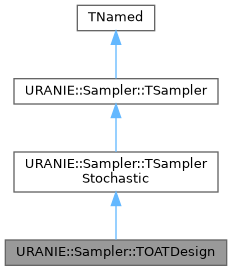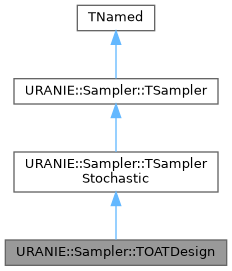Documentation / Developer's manual
Available modules
Calibration, DataServer, Launcher, MetaModelOptim, Modeler, Optimizer, ReLauncher, Reliability, ReOptimizer, Sampler, Sensitivity, UncertModeler, XmlProblem, |
Uranie / Sampler
v4.10.0
|
This class creates a "One factor At a Time" design of experiment. It has been developped mainly for finite differences sensitivity computation. More...
#include <TOATDesign.h>


Public Member Functions | |
Constructor and Destructor | |
| TOATDesign (URANIE::DataServer::TDataServer *tds, TString mode="regular", Int_t number=2) | |
| Constructor of the OAT sampler. More... | |
| virtual | ~TOATDesign () |
| Default destructor. More... | |
Getting and setting parameters | |
| virtual Bool_t | getHasData () |
| Returns TRUE if the internal data server contains data. More... | |
| virtual Double_t | getNumberOfModifications () |
| Get the number of modifications per attribute and nominal values. More... | |
| virtual TString | getSamplingMode () |
| Get OAT sampling mode. More... | |
| virtual TString | getGenerationMode () |
| Get random generation method. More... | |
| virtual TList * | getChangingAttList () |
| Get the list of changing attributes. More... | |
| virtual TMap * | getRangeInformation () |
| Get the list mapping the names of the changing attributes and their corresponding range information. More... | |
| virtual URANIE::DataServer::TDSNtupleD * | getNominalValueTuple () |
| Get the tuple storing the nominal values of the attributes. More... | |
| virtual void | setOption (TString mode, Int_t number) |
| Set the sampling mode and number of modifications. More... | |
| Double_t | getStepPrecision () |
| Get the value of the machine precision. More... | |
| void | setStepPrecision (Double_t dval) |
| Set the value of the machine precision (default value is dStepPrecision 1.0e-16) More... | |
| void | setRange (TString changingAttName, Double_t rangeValue, Bool_t is_percent=kFALSE) |
| Set the range of the sampling for a changing attribute. More... | |
| void | setRange (TString changingAttName, TString rangeAttName, Bool_t is_percent=kFALSE) |
| Set the name of the attribute holding the range of the sampling for a changing attribute. More... | |
Generation of the sample | |
| virtual void | generateSample (Option_t *option="") |
| Generates the sample. More... | |
Printing Log | |
| virtual void | printLog (Option_t *option="") |
| Prints the log. More... | |
 Public Member Functions inherited from URANIE::Sampler::TSamplerStochastic Public Member Functions inherited from URANIE::Sampler::TSamplerStochastic | |
| TSamplerStochastic (URANIE::DataServer::TDataServer *tds, Option_t *option, Int_t nCalcul) | |
| Constructor with a dataserver. More... | |
| virtual | ~TSamplerStochastic () |
| Default destructor. More... | |
| void | setSeed (Int_t ind=0) |
| Init the seed. More... | |
| Int_t | getSeed () |
| Returns the seed value. More... | |
 Public Member Functions inherited from URANIE::Sampler::TSampler Public Member Functions inherited from URANIE::Sampler::TSampler | |
| TSampler (URANIE::DataServer::TDataServer *tds, Option_t *option, Int_t nCalcul) | |
| Constructor with a TDataServer, the options and the size of the sample. More... | |
| virtual | ~TSampler () |
| Default destructor. More... | |
| Int_t | GetID () |
| Returns the ID of the class. More... | |
| void | setMethodName (TString str) |
| Sets the method name in a global variable. More... | |
| TString | getMethodName () |
| Gets the method name. More... | |
| virtual URANIE::DataServer::TDataServer * | getTDS () |
| Return the TDS filling by the sampling algorithm. More... | |
| void | parseOption (Option_t *option) |
| Parse the option. More... | |
| virtual void | createListOfAttributes () |
| Creates the List of attributes to simulate. More... | |
| virtual void | createTuple () |
| Creates the TDSNtupleD of data with only the TStochasticAttributes. More... | |
| URANIE::DataServer::TDSNtupleD * | getTuple () |
| Returns the TDSNtupleD of data. More... | |
| virtual void | fillOtherAttributes () |
| Fills the TDSNtupleD of data with other TFormulaAttributes. More... | |
| void | setLog () |
| void | unsetLog () |
| void | changeLog () |
| Bool_t | getLog () |
Protected Member Functions | |
State machine | |
For the stochastic methods, two states can be created init and terminate which are executed just before the generation of the sample for the first one, and after the generation for the second one. They can be used for pre and post treatment purpose. | |
| virtual void | init () |
| Initialise the sampling procedure. More... | |
| virtual void | terminate () |
| The post-processing step. Nothing is done. More... | |
State machine | |
For the stochastic methods, two2 states can be created init and terminate which are executed just before the generation of the sample for the first one, and after the generation for the second one. They can be used for pre and post treatment purpose. | |
Private Attributes | |
| TString | _sMode |
| Sampling mode. So far, can be "random" or "regular". More... | |
| TString | _sGenMode |
| Data generation mode. Only used in the random mode context, can be "lhs", or "srs". More... | |
| Int_t | _nNbModif |
| Number of modification for each nominal value of each changing attribute. More... | |
| TList | _changingAttList |
| List of changing attributes. More... | |
| TMap | _infoRangeMap |
| A list mapping the names of the changing attributes and their corresponding range information. More... | |
| URANIE::DataServer::TDSNtupleD * | _nominalValueTuple |
| A tuple storing the nominal values of the attributes. More... | |
| Bool_t | _bHasData |
| Boolean value set to TRUE if the data server _tds contains data. More... | |
| Double_t | _dStepPrecision |
| machine precesion to detect 0.0 More... | |
Additional Inherited Members | |
 Public Attributes inherited from URANIE::Sampler::TSampler Public Attributes inherited from URANIE::Sampler::TSampler | |
| Int_t | _nS |
| The size of the sample. More... | |
| Int_t | _nX |
| The size of attributes to sample. More... | |
| URANIE::DataServer::TDSNtupleD * | _ntsample |
| the tntuple of data More... | |
| TString | _sMethod |
| The title of the sampler method. More... | |
| Bool_t | _blog |
| Log Printing. More... | |
| Bool_t | _bupdateFile |
| Update the back up file when generating the attributeformula if there is some. More... | |
| URANIE::DataServer::TDataServer * | _tds |
| Pointer to a TDS. More... | |
| TList * | _lstOfAttributesToSample |
| The list of Stochastic Attributes to sample. More... | |
 Protected Attributes inherited from URANIE::Sampler::TSamplerStochastic Protected Attributes inherited from URANIE::Sampler::TSamplerStochastic | |
| Int_t | _nSeed |
Detailed Description
This class creates a "One factor At a Time" design of experiment. It has been developped mainly for finite differences sensitivity computation.
The principle of the OAT design of experiment is to modify only one attribute at a time, all the other factors being kept at a nominal value. This is the simplest way to compute partial derivatives or sensitivities. For the latter application however, it might not be the best solution as this approach does not explore multi-factorial and non-linear effects.
The present implementation is an improvement of TOATSampling. The user has now two ways of defining the nominal values of the attributes: by setting the default value for each attribute or by providing a tds with a set of nominal values. In the latter case, more than one set of nominal values can be provided, and an OAT sampling will be generated for each one of them.
The generated values are sampled inside an interval, centered on the nominal value. The width of this interval is defined as the "range". For each changing attribute, the user has to define the range, either as a numerical value, or as the name of an attribute of the tds. In both cases, an option allows the resulting value of the range to be interpreted as a percentage of the nominal value.
Two modes of data generation are available. The "regular" mode will generate data regularily spaced over the interval. The "random" mode will generate random values inside the interval. In the "random" mode, the changing attributes must be TStochasticAttribute objects. This means that (at the moment) this mode can't be used on attributes loaded from a file.
The number of generated values is not limited. It just needs to be greater or equal to 2. And if the sampling is "regular", it must also be even. But if an odd value is given, it will be reduced to an even one.
Here is a small example script, showing a regular OAT sampling on 2 attributes whose nominal values are read from a file:
--— file myNominalValues.dat --—
#COLUMN_NAMES: x1 | rx1 | x2 3.0 0.4 2.0 5.0 0.2 3.0
--— data generation script --—
--— file myOATSampling.dat --—
#COLUMN_NAMES: x1| rx1| x2| __nominal_set__| __modified_att__| myTDS__n__iter__ 3.00 0.4 2.000 1.0 -1.0 1.0 2.80 0.4 2.000 1.0 0.0 2.0 3.20 0.4 2.000 1.0 0.0 3.0 2.90 0.4 2.000 1.0 0.0 4.0 3.10 0.4 2.000 1.0 0.0 5.0 3.00 0.4 1.900 1.0 2.0 6.0 3.00 0.4 2.100 1.0 2.0 7.0 3.00 0.4 1.950 1.0 2.0 8.0 3.00 0.4 2.050 1.0 2.0 9.0 5.00 0.2 3.000 2.0 -1.0 10.0 4.90 0.2 3.000 2.0 0.0 11.0 5.10 0.2 3.000 2.0 0.0 12.0 4.95 0.2 3.000 2.0 0.0 13.0 5.05 0.2 3.000 2.0 0.0 14.0 5.00 0.2 2.850 2.0 2.0 15.0 5.00 0.2 3.150 2.0 2.0 16.0 5.00 0.2 2.925 2.0 2.0 17.0 5.00 0.2 3.075 2.0 2.0 18.0
The attribute nominal_set refers to the set of nominal values used to generate the data. The attribute modified_att gives the index of the attribute whose value has been modified. If it is -1, this means that all the values are nominal.
Constructor & Destructor Documentation
◆ TOATDesign()
| URANIE::Sampler::TOATDesign::TOATDesign | ( | URANIE::DataServer::TDataServer * | tds, |
| TString | mode = "regular", |
||
| Int_t | number = 2 |
||
| ) |
Constructor of the OAT sampler.
- Parameters
-
tds (URANIE::DataServer::TDataServer*) Data server containing the attributes. mode (TString): the sampling mode. It can be either: - "regular" (or "reg"): generate regularily spaced values around the nominal value.
- "lhs": generate random values using the "lhs" sampling method
- "srs": generate random values using the "srs" sampling method
- "random" (or "rand"): same as "srs". (Default = "regular").
number (Int_t): the number of values to generate for each nominal value of a given attribute. If _sMode is "regular", number must be even and equal or greater than 2. Otherwise, _nNbModif is set to max(2, number-1).
- Exceptions
-
UErrorExceptions if "number" is negative or null UErrorExceptions if "number" is odd and "mode" is "regular". UErrorExceptions if "mode" is unknown.
◆ ~TOATDesign()
|
virtual |
Default destructor.
Member Function Documentation
◆ generateSample()
|
virtual |
Generates the sample.
This function creates the OAT sampling data.
- Parameters
-
option (Option_t *): this parameter is not used at the moment. (Default = "").
Implements URANIE::Sampler::TSampler.
◆ getChangingAttList()
|
inlinevirtual |
Get the list of changing attributes.
References _changingAttList.
◆ getGenerationMode()
|
inlinevirtual |
Get random generation method.
References _sGenMode.
◆ getHasData()
|
inlinevirtual |
Returns TRUE if the internal data server contains data.
◆ getNominalValueTuple()
|
inlinevirtual |
Get the tuple storing the nominal values of the attributes.
References _nominalValueTuple.
◆ getNumberOfModifications()
|
inlinevirtual |
Get the number of modifications per attribute and nominal values.
References _nNbModif.
◆ getRangeInformation()
|
inlinevirtual |
Get the list mapping the names of the changing attributes and their corresponding range information.
References _infoRangeMap.
◆ getSamplingMode()
|
inlinevirtual |
Get OAT sampling mode.
References _sMode.
◆ getStepPrecision()
|
inline |
Get the value of the machine precision.
- Returns
- (Double_t) the step precision value where to change with the step value in the TAttribute
References _dStepPrecision.
◆ init()
|
protectedvirtual |
Initialise the sampling procedure.
This function creates a tuple containing the nominal values of all the attributes of the data server. It also creates two new attributes:
- nominal_set: tells the user which set of nominal value is used;
- modified_att: tells which attribute has been modified.
- Exceptions
-
UErrorExceptions if the original data server is empty and one of its attributes has no default value.
Reimplemented from URANIE::Sampler::TSamplerStochastic.
◆ printLog()
|
virtual |
Prints the log.
Prints some internal informations about the object.
- Parameters
-
option (Option_t *): this parameter is not used at the moment. (Default = "").
Reimplemented from URANIE::Sampler::TSamplerStochastic.
◆ setOption()
|
virtual |
Set the sampling mode and number of modifications.
This function sets the values of the _sMode and _nNbModif variables.
- Parameters
-
mode (TString): the sampling mode. It can be either: - "regular": generate regularily spaced values around the nominal value.
- "lhs": generate random values using the "lhs" sampling method
- "srs": generate random values using the "srs" sampling method
- "random": same as "srs".
number (Int_t): the number of values to generate for each nominal value of a given attribute. If _sMode is "regular", number must be even and equal or greater than 2. Otherwise, _nNbModif is set to max(2, number-1).
- Exceptions
-
UErrorExceptions if "mode" is unknown.
UErrorExceptions if "number" is odd and "mode" is "regular".
◆ setRange() [1/2]
| void URANIE::Sampler::TOATDesign::setRange | ( | TString | changingAttName, |
| Double_t | rangeValue, | ||
| Bool_t | is_percent = kFALSE |
||
| ) |
Set the range of the sampling for a changing attribute.
This function sets the value of the range inside which the values of the changing attribute will be sampled. If this value is R, and the nominal value is N, the new values will be sampled in the interval [N-R/2; N+R/2]. The range can also be interpreted as a percentage p of the nominal value, in which case R = p * N / 100.
- Note
- a function setRange must be called for every changing attribute. There is no default range value.
- Parameters
-
changingAttName (TString): name of the changing attribute to sample. rangeValue (Double_t): the range value, i.e. the width of the interval around the nominal value where the sampling will take place. is_percent (Bool_t): if True, the rangeValue parameter will be interpreted as a percentage of the nominal value of the changing attribute. (Default = kFALSE).
- Exceptions
-
UErrorExceptions if no attribute changingAttName is found in the data server. UErrorExceptions if the data server is empty and the attribute has no default value. UErrorExceptions if range is negative or null.
UErrorExceptions if mode is random and the attribute isn't a TStochasticAttribute. UErrorExceptions if a range was already set for the attribute.
◆ setRange() [2/2]
| void URANIE::Sampler::TOATDesign::setRange | ( | TString | changingAttName, |
| TString | rangeAttName, | ||
| Bool_t | is_percent = kFALSE |
||
| ) |
Set the name of the attribute holding the range of the sampling for a changing attribute.
This function associate the name of two attributes of the data server, the first being the changing attribute, the second holding the size of the range of the sampling. In this case, the value of the range will be read directly from the data server or the range attribute's default value.
- Note
- a function setRange must be called for every changing attribute. There is no default range value.
- Parameters
-
changingAttName (TString): name of the changing attribute to sample. rangeAttName (TString): name of the attribute holding the range value. is_percent (Bool_t): if True, the rangeValue parameter will be interpreted as a percentage of the nominal value of the changing attribute. (Default = kFALSE).
- Exceptions
-
UErrorExceptions if no attribute rangeAttName is found in the data server. UErrorExceptions if no attribute changingAttName is found in the data server. UErrorExceptions if the data server is empty and the attribute has no default value. UErrorExceptions if the data server is empty and the range attribute has no default value.
UErrorExceptions if the data server is empty and the range attribute's default value is negative or null. UErrorExceptions if mode is random and the attribute isn't a TStochasticAttribute. UErrorExceptions if a range was already set for the attribute.
◆ setStepPrecision()
|
inline |
Set the value of the machine precision (default value is dStepPrecision 1.0e-16)
- Parameters
-
dval (Double_t) the step precision value where to change with the step value in the TAttribute
References _dStepPrecision.
◆ terminate()
|
inlineprotectedvirtual |
The post-processing step. Nothing is done.
Reimplemented from URANIE::Sampler::TSamplerStochastic.
Member Data Documentation
◆ _bHasData
|
private |
Boolean value set to TRUE if the data server _tds contains data.
◆ _changingAttList
|
private |
List of changing attributes.
Referenced by getChangingAttList().
◆ _dStepPrecision
|
private |
machine precesion to detect 0.0
Referenced by getStepPrecision(), and setStepPrecision().
◆ _infoRangeMap
|
private |
A list mapping the names of the changing attributes and their corresponding range information.
Referenced by getRangeInformation().
◆ _nNbModif
|
private |
Number of modification for each nominal value of each changing attribute.
Referenced by getNumberOfModifications().
◆ _nominalValueTuple
|
private |
A tuple storing the nominal values of the attributes.
Referenced by getNominalValueTuple().
◆ _sGenMode
|
private |
Data generation mode. Only used in the random mode context, can be "lhs", or "srs".
Referenced by getGenerationMode().
◆ _sMode
|
private |
Sampling mode. So far, can be "random" or "regular".
Referenced by getSamplingMode().


